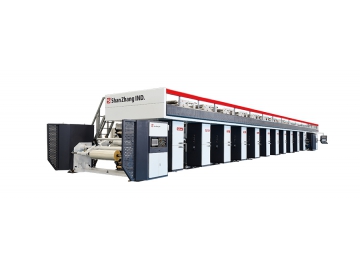Rotogravure Printing Press with Electronic Line Shaft
SZIND electronic line shaft rotogravure printing press can be offered in configuration of 14 printing units. Each printing plate cylinder (gravure cylinder) from every printing unit is driven by a servo motor, while the register function is accomplished, that results faster printing speed ranges from 220m/min to 450m/min. A wide range of flexible materials can be printed by this ELS rotogravure printing press, including BOPP, PET, CPP, Nylon, PE, PP, PVA, PVC shrink films, as well as paper and aluminum foils.
We have 5 standard types of electronic line shaft rotogravure printing presses for you to choose from. If you have other specific requirements, custom-engineered models are also available.
Standard width: 850/1050/1250mm (can be customized, Max. 2500mm)
Applicable substrate: various rolls of plastic film, aluminum foil, paper
Specifications
Maximum machine speed: 400m/min
Roll diameter: 120mm to 286mm
Repeat length: 380mm to 900mm
Tension control precision: ±1N
Specifications
Maximum machine speed: 350m/min
Roll diameter: 120mm to 286mm
Repeat length: 380mm to 900mm
Tension control precision: ±2N
Specifications
Maximum machine speed: 300m/min
Roll diameter: 120mm to 286mm
Repeat length: 380mm to 900mm
Specifications
Maximum machine speed: 280m/min
Roll diameter: 118mm to 278mm
Repeat length: 370mm to 873mm
Tension control precision: ±2N
Specifications
Maximum machine speed: 220m/min
Roll diameter: 120mm to 286mm
Repeat length: 380mm to 900mm
Tension control precision: ±2N
1. Equipped with double shafts driven by dual-motor, facilitating operation and saving both material and time.
2. Alarm will be activated when webs on unwind unit are released to the end or presets are reached, and operator is informed to quick change rolls.
3. With closed loop dancer tension control, the roll diameter and adhesive position will be automatically detected, this greatly reduces difficulty of manual operation and increases acceptance rate of splicing, enabling simultaneous running with printing machine.
4. By using closed loop taper tension control in rewinding process and equipping with nip roll, the consistency of web tension can be maintained, ensuring an optimal roll surface.
1. Plate cylinder is installed by shaftless pneumatic chucking system, and it is driven by independent servo motor having a variable speed drive.
2. Each printing unit is equipped with ink metering roller to deliver constant ink flow, avoiding ink splattering during high speed running while ensure the quality of printing.
3. Side shields of printing unit and ink fountain are all plated with Teflon coating.
4. Impression cylinder is equipped with compensation roller in concerted action with guide roller, this can minimize variation of web length when impression cylinder moves up and down.
5. By using chambered doctor blade, the doctor blade can be moved freely in three different directions, i.e. left and right, up and down, forward and backward. The doctor blade is independently driven by motor, and the frequency of movement is adjustable.
6. Equipped with service trolley for ink feeding, and diaphragm pump for ink circulation.
1. Adopting Siemens integrated register system.
2. Each color printing is designed with an independent operator screen, it is convenient for operator to know the state of printing registration, greatly enhancing work efficiency and reducing work intensity for operators.
3. Fast modifying of digits to correct printing registration errors, this achieves precise printing registration, and printing plate can be changed rapidly.
4. The register system has memory storage function for registration position, so that the memorized printing plate can be quickly positioned. It also has pre-register function for fast positioning of new printing plate.
1. The drying system features high efficiency with low solvent retention, it comes fully adaptable to requirements of water-based ink printing.
2. Automatic intelligent continuous temperature control with air recirculating function, enables reduction of energy consumption to the minimum.
3. Multiple drying methods are available to adapt different actual needs, including electric heating, steam heating, and heat transfer oil heating.
1. Cooling roller is made of aluminum alloy and features low inertia, used for forced water circulation cooling.
2. Both ends of cooling roller are supported by double-row self-aligning roller bearings, and overflowed cooling water is automatically recirculated.
3. Cooling roller is designed with large contact angle and cooling surface, allowing high cooling efficiency.
Online inspection—Quality inspection system is directly installed on printing line, monitors and feedbacks product quality in real time, decreasing unnecessary waste.
Ink viscosity control—This unit aims at automatic controlling of ink viscosity, facilitating follow-up operations.
Electrostatic absorption of ink—This function easies ink absorption into paper during printing.
Moveable frame—The frame allows double-sided printing.
